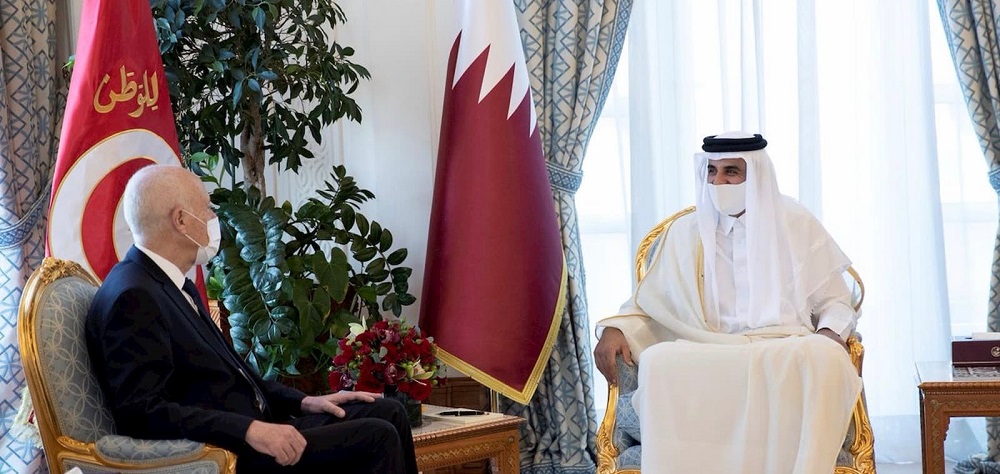Alwaght- On Saturday, Tunisia’s President K ais Saied arrived in Doha, leading a high-ranking delegation in his first visit to the Persian Gulf emirate since he assumed office last year.
The Tunisia-Qatar relations since the Arab uprisings of 2011 and highs and lows of the regional developments experienced a growing trend, with several visits of the Qatari emir to the North African country showing Tunisia’s importance in the Qatari foreign policy.
Since his assumption of power in June 2013, Qatar’s Emir Sheikh Tamim bin Hamad al Thani visited Tunisia four times, unmatched among the top foreign leaders traveling to the country. The reason is the distinct role played by the Muslim Brotherhood-aligned Annahda Movement in the national political developments.
In the past years, North Africa has been a theater to the geopolitical rivalry of two opposite poles of the (Persian) Gulf Cooperation Council, playing as a milestone demonstrating the weight and strategic depth of the two sides in the Arab world.
Qatar vs. UAE-Saudi Arabia camp in Tunisia
Since the ouster of the Tunisian dictator Zine El Abidine Ben Ali in the revolution of 2011 that marked a prelude to a string of uprisings across the Arab world, developments in Tunisia provided a battleground for Qatar on the one hand and the Saudi-Emirati alliance on the other hand. The UAE and Saudi Arabia are heavily concerned about the highlighted presence of the Muslim Brotherhood-affiliated Annahda Movement and the Islamists in power as they find it posing a threat to their security interests.
Over the past years, the UAE and Saudi Arabia frequently designed plans to apply to Tunisia their Egypt scenario, in which a coup ousted the Muslim Brotherhood President Mohamad Morsi from power and brought an ally from the military to rule. In June, the French-language Al-Watan newspaper of Algeria reported that Turkey’s intelligence network frustrated a coup attempt in Tunisia arranged by the UAE. Also, in June 2018, Turkish Yeni Safak paper reported a coup plot in Tunisia led by dismissed interior minister Lotfi Brahem in coordination with UAE intelligence service. But the failure of the project due to the difference in the political and military structure of Tunisia pushed Abu Dhabi and its ally Riyadh to embark on crisis-making in political and economic areas to undermine the Annahda legitimacy at home. The UAE troublesome role can be traced to the parliamentary election of the late last year in which Annahda once again gained the majority of the seats in a heavy blow to secular parties.
In May, when Annahda’s leader and parliament speaker Rached Ghannouchi congratulated Faiz Seraj of the Government of National Accord (GNA) in Libya for victory over the warlord Khalifa Haftar-led Libyan National Army (LNA), backed by Saudi Arabia and the UAE, a political wave was unleashed against him by political opponents close Abu Dhabi accusing him of breaching the principle of Tunisian neutrality to the Libyan developments. The move was aimed at his removal and dissolution of the parliament but failed to gain strong support.
Another political crisis in which the UAE footprints are tangible is the resignation of the Prime Minister Elyes Fakhfakh, of the Democratic Forum for Labour and Liberties which is an ally to the Annahda, following corruption charges. The development led to disunity over picking a new PM and hence a political crisis. During the crisis, Saudi and Emirati media fueled the fire of differences between Kais Saied and Annahda using all of their propagandistic power.
Now Saied’s trip to Qatar sends a crucial message to the Saudis and the Emiratis who in the past months have gone to great lengths to forge a political crisis in Tunisia and fish in muddy waters. These come while the Tunisian government took oppositional stances on the UAE normalization with the Israeli regime and underscored the advocacy to the Palestinian liberation ideals.
Moreover, the trip shows that Qatar has saved its place as one of the key investors and trade partners of Tunisia. Its exports to Tunisia between 2011 and 2019 have increased six-folds, as Tunisian exports to Qatar increased ten-folds.
Nearly a decade after Tunisian street vendor Mohamed Bouazizi set himself on fire and sparked the Arab revolutions of 2011, the deep inequity, economic crisis, and corruption are causing discontent among the youths in the country. While the national economy is profoundly reliant on tourism, the coronavirus outbreak dealt a destructive blow to the already-weakened economy of Tunisia. The tourism industry last year posted 60 percent income shrinkage as the crisis destroyed 165,000 tourism-reliant jobs in the 11-million population country.
In the middle of this economic predicament, Qatar, with its financial aids, can play a substantial role in helping the North African country to pass the crisis. When Tunisia this summer hosted an international investment and capital forum dubbed “Tunisia 2020”, Qatar’s emir attended and promised $1.25 billion in economic aids to the Tunisian economy.
Also, while Saudi Arabia and the UAE take advantage of the Tunisian economic crisis to recruit youths from Tunisia to the terrorist groups for the fight in the regional battlegrounds, especially in Libya, Qatar has vowed to create thousands of jobs for the youths through finances to Qatar Friendship Fund in Tunisia.
While Abu Dhabi counts the costs of its normalization with Tel Aviv after the departure of Trump as the leading sponsor of the process, Qatar secures another victory in the Tunisian equations in the arm wrestling with the UAE.



























